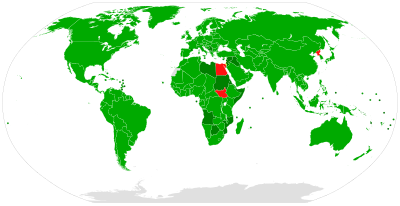
Back معاهدة حظر الأسلحة الكيميائية Arabic Конвенция за химическите оръжия Bulgarian রাসায়নিক অস্ত্র চুক্তি Bengali/Bangla Convenció sobre Armes Químiques Catalan Úmluva o chemických zbraních Czech Konventionen om kemiske våben Danish Chemiewaffenkonvention German Σύμβαση για την κατάργηση των χημικών όπλων Greek Konvencio pri Kemiaj Armiloj Esperanto Convención sobre Armas Químicas Spanish
| Convention on the Prohibition of the Development, Production, Stockpiling and Use of Chemical Weapons and on their Destruction | |||
|---|---|---|---|
 Participation in the Chemical Weapons Convention
| |||
| Drafted | 3 September 1992[1] | ||
| Signed | 13 January 1993[1] | ||
| Location | Paris and New York[1] | ||
| Effective | 29 April 1997[1] | ||
| Condition | Ratification by 65 states[2] | ||
| Signatories | 165[1] | ||
| Parties | 193[1] (List of state parties) Four UN states are not party: Egypt, Israel, North Korea and South Sudan. | ||
| Depositary | UN Secretary-General[3] | ||
| Languages | Arabic, Chinese, English, French, Russian and Spanish[4] | ||
The Chemical Weapons Convention (CWC), officially the Convention on the Prohibition of the Development, Production, Stockpiling and Use of Chemical Weapons and on their Destruction, is an arms control treaty administered by the Organisation for the Prohibition of Chemical Weapons (OPCW), an intergovernmental organization based in The Hague, The Netherlands. The treaty entered into force on 29 April 1997. It prohibits the use of chemical weapons, and also prohibits large-scale development, production, stockpiling, or transfer of chemical weapons or their precursors, except for very limited purposes (research, medical, pharmaceutical or protective). The main obligation of member states under the convention is to effect this prohibition, as well as the destruction of all current chemical weapons. All destruction activities must take place under OPCW verification.
As of August 2022,[update] 193 states have become parties to the CWC and accept its obligations. Israel has signed but not ratified the agreement, while three other UN member states (Egypt, North Korea and South Sudan) have neither signed nor acceded to the treaty.[1][5] Most recently, the State of Palestine deposited its instrument of accession to the CWC on 17 May 2018. In September 2013, Syria acceded to the convention as part of an agreement for the destruction of Syria's chemical weapons.[6][7]
As of February 2021, 98.39% of the world's declared chemical weapons stockpiles had been destroyed.[8] The convention has provisions for systematic evaluation of chemical production facilities, as well as for investigations of allegations of use and production of chemical weapons based on the intelligence of other state parties.
Some chemicals which have been used extensively in warfare but have numerous large-scale industrial uses (such as phosgene) are highly regulated; however, certain notable exceptions exist. Chlorine gas is highly toxic, but being a pure element and widely used for peaceful purposes, is not officially listed as a chemical weapon. Certain state powers (e.g. the Assad regime of Syria) continue to regularly manufacture and implement such chemicals in combat munitions.[9] Although these chemicals are not specifically listed as controlled by the CWC, the use of any toxic chemical as a weapon (when used to produce fatalities solely or mainly through its toxic action) is in-and-of itself forbidden by the treaty. Other chemicals, such as white phosphorus,[10] are highly toxic but are legal under the CWC when they are used by military forces for reasons other than their toxicity.[11]
- ^ a b c d e f g "Convention on the Prohibition of the Development, Production, Stockpiling and Use of Chemical Weapons and on their Destruction". United Nations Treaty Collection. 3 January 2018. Retrieved 3 January 2018.
- ^ Chemical Weapons Convention, Article 21.
- ^ Chemical Weapons Convention, Article 23.
- ^ Chemical Weapons Convention, Article 24.
- ^ "Angola Joins the Organisation for the Prohibition of Chemical Weapons". OPCW. Retrieved 1 May 2016.
- ^ "Resolution 2118 (2013)" (doc). United Nations documents. United Nations. 27 September 2013. p. 1. Retrieved 28 April 2017.
Noting that on 14 September 2013, the Syrian Arab Republic deposited with the Secretary-General its instrument of accession to the Convention on the Prohibition of the Development, Production, Stockpiling and Use of Chemical Weapons and on their Destruction (Convention) and declared that it shall comply with its stipulations and observe them faithfully and sincerely, applying the Convention provisionally pending its entry into force for the Syrian Arab Republic
- ^ "U.S. sanctions Syrian officials for chemical weapons attacks". Reuters. 12 January 2017. Retrieved 28 April 2017.
- ^ "OPCW by the Numbers". Organisation for the Prohibition of Chemical Weapons. Retrieved 9 February 2021.
- ^ "Third report of the Organization for the Prohibition of Chemical Weapons United Nations Joint Investigative Mechanism". 24 August 2016.
- ^ "'White phosphorus not used as chemical weapon in Syria'". www.aa.com.tr. Retrieved 22 May 2021.
- ^ Paul Reynolds (16 November 2005). "White phosphorus: weapon on the edge". BBC News. Retrieved 4 April 2007.
© MMXXIII Rich X Search. We shall prevail. All rights reserved. Rich X Search